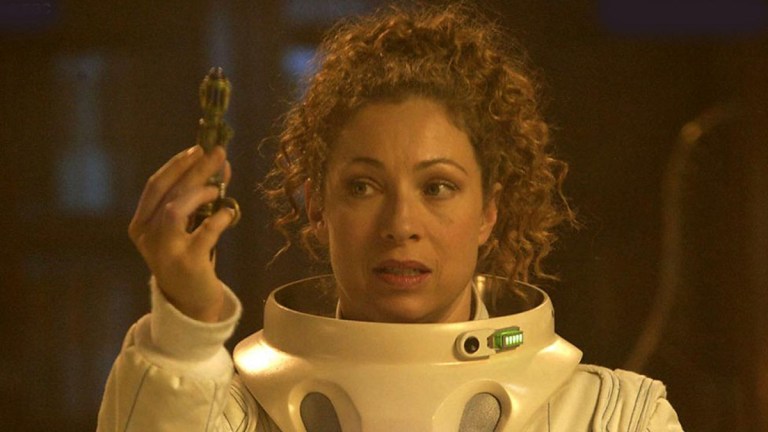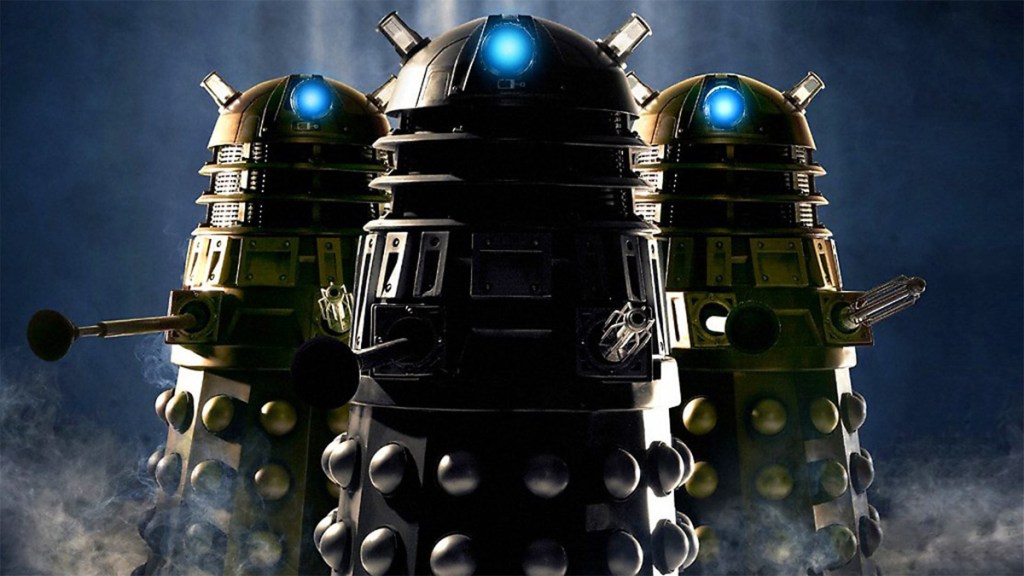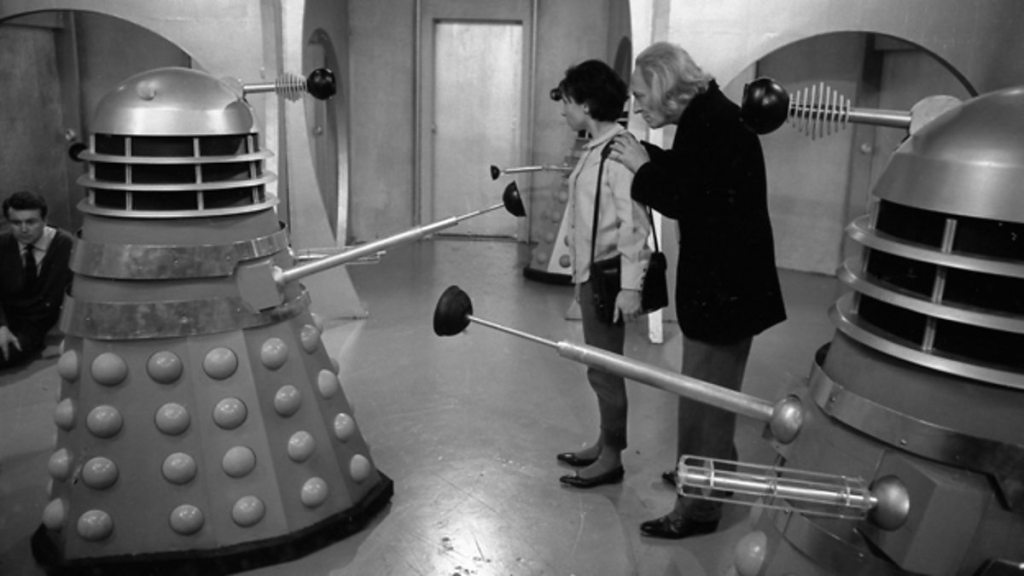Debunking Doctor Who Urban Legends: Daleks, JFK, and River Song’s Dirty Joke
True or false? We sort through some of Doctor Who’s most persistent myths to separate the fact from the fiction.

Much like the Doctor themselves, Doctor Who is a show with a long and eventful history. Various groups and individuals have attempted to track it, but no one person has the entire picture, and even in its official history there can be contradictions, rumours, and stories that grow in the retelling until they gain a truth all of their own.
It’s time to address some of the most persistent urban legends and determine just how much truth they have in them…
Daleks Are Contractually Obligated To Appear At Least Once Each Series
Much like the Daleks themselves, this one keeps coming back. It is common knowledge that the Daleks are not actually the intellectual property of the BBC, but of the estate of their creator, Terry Nation (Perhaps less well-known is the fact that Steven Moffat has a similar arrangement with the Weeping Angels).
The Daleks are of course the Doctor’s most iconic and terrifying enemy. “But!” fans pipe up “Aren’t they overused? Haven’t we seen too much of the Daleks?”
Obviously, the theory goes, this cannot simply be because the show’s writers want to use a popular recurring villain. The malignant forces of the Terry Nation estate must force the BBC to use the Daleks once per season, or they will lose the rights forever!

The first thing to do is check, have the Daleks actually appeared in every season of the new series? And they have, except that Season 6 and Season 10 only featured brief cameos by the angry pepperpots, and during Chibnall’s run they’ve been mostly confined to the New Year’s Day specials.
It’s also worth noting that while Nation’s estate controls the rights to the Daleks, they don’t really have anything to do with them but license them to the BBC. Nation himself learned the hard way that there was no demand for a stand-alone Dalek TV series.
Moffat himself has debunked the rumours, saying “You certainly don’t wheel the Daleks out because you’ve got a contractual obligation to provide Daleks.” The main reason the Daleks show up so often, according to Moffat, is that while they might seem to pop up regularly for us, for the show’s main audience it is a rare special treat.
As Moffat says, “For a child, a year between Dalek stories is an eternity – I remember as a kid saying ‘Why haven’t they done the Daleks for ages? It’s been four or five weeks!’”
Doctor Who’s First Episode Was Delayed by JFK’s Assassination
If Doctor Who is a show that attracts conspiracy theories, the issue is only compounded by the fact that its first episode coincides with the most conspiracy-theory-laden historical event of all time – the assassination of John F Kennedy the previous day.
There are a couple of versions of this legend. Some say that “An Unearthly Child” was broadcast ten minutes later than it was supposed to because of an extended report on the assassination. Others say the delay was caused by the murder of Lee Harvey Oswald, even though that wouldn’t happen until the day after.
The truth is that “An Unearthly Child” was only delayed one minute, 20 seconds later than its advertised 5.15pm time slot, and that was because Grandstand overran.
However, coverage of the assassination did lead to lower than-hoped-for viewing figures, which led to the pilot being repeated the following week on the 30th of November.
The Dalek Name Came From an Encyclopaedia
“Dalek” is a brilliant word isn’t it? Almost perfectly designed for those robotic, yet perpetually-about-to-throw-a-strop voices, dripping with menace, and yet, before 1963 the word had no meaning at all in the English language, it’s just some sounds.
Terry Nation himself gave the Daily Mirror an origin story for the unusual name, saying he saw some volumes of an encyclopaedic dictionary where one volume covered all the entries from “Dal” to “Lek”. It is a story that spread everywhere from the Radio Times to the Oxford English Dictionary. But Doctor Who fans being what we are, it wasn’t long before someone smelled a rat.
For starters, to cover all the concepts, alphabetically, that an encyclopaedia might catalogue between “Dal” and “Lek” would have to be massive.

After ten years, Nation came clean, telling the New Statesman, “In a desperate attempt to satisfy persistent journalists, who wanted some profound explanation for my naming the Daleks, I told them that I’d been inspired by the letters on a volume of an encyclopaedia. But . . . no encyclopaedia in print covers those letters DAL-LEK. Anyone checking the facts could have found me out . . . The name, it simply rolled off the typewriter.”
There is another twist in the tale. The word “Dalek” did exist before 1963, in the Serbo-Croatian language. It means “far”, “far away”, “distant” or maybe even “alien”. It’s strangely appropriate – but Nation never spoke Serbo-Croatian.
The Valeyard Means “The Law Doctor”
The Sixth Doctor’s era was not a great time for the series, through no fault of poor Colin Baker. But while the show had some pretty wild missteps (the Fifth Doctor sacrificed himself to save his companion, Peri Brown, only for the Sixth Doctor to try to strangle her to death minutes later), it had a few moments where it was ahead of its time.
For starters, Colin Baker wanted his Doctor to ditch the more comical attire of the previous couple of Doctors, and instead wear something more like a leather jacket. Instead, he wore a patchwork technicolour nightmare that has remained the low point for the show’s entire 60-year run, but still, the thought was there.
It also saw the series switch from its traditional 25-minute episodes to 45-minute stories, a switch that the 2005 series would repeat and make permanent.
And finally, the Sixth Doctor attempted one of the most ambitious arcs in the show’s history. “The Trial of a Timelord” was actually a great idea. A trilogy of stand-alone Doctor Who adventures, told through the framing device of the Doctor being put on trial by his own people (again), prosecuted by a sinister figure who would turn out to be a darker version of his own future self. As an idea, it’s brilliant, it’s the sort of thing you could see the show pulling off superbly today.
But it has to be said, the execution was pretty pants.
But the dark future version of the Doctor himself still stuck in people’s minds, and very quickly word spread that his name, “the Valeyard” actually meant “Doctor of Law”.
It doesn’t though. Once again, the writer hit upon the name “Valeyard” by… making it up. It doesn’t mean anything.
River Song’s Name Is a Dirty Joke
Steven Moffat, meanwhile, would never disappoint. With a character like River Song, the Doctor’s on-again-off-again-dead-again-alive-again wife, it is perhaps not surprising that her name is a dirty joke.

As Moffat himself says, “Russell and I went through a phase of trying to work out Doctor Who titles with rude acronyms, to wind up people on Internet message boards.”
Moffat’s contribution was “A River Song Ending” (we’ll let you work out the acronym yourselves).
Davies responded by asking “What’s a River song?” and Moffat replied, “I’ll just call someone River Song, and they’ll have to die”. That episode would eventually go out under the title “The Forest of the Dead”.
Ridley Scott Almost Designed the Daleks
Yes, that Ridley Scott, the director behind such legendary science fiction films as Prometheus and Alien: Covenant, started out as a production designer. One of his first gigs, after cutting his teeth on the cop show, Z Cars, was the new sci-fi show, Doctor Who, and one of his first assignments indeed was to design the villains in the show’s second serial. However, shortly before work was due to begin, Scott left behind the BBC and design work to train as a director at Granada Television, leaving Raymond Cusick to take on the job.
We’re sure he’s still kicking himself over that today. Oh and while we’re here, Cusick didn’t get the idea for the Daleks from pepper pots, but he did use pepper pots to demonstrate how the Daleks would move around.
Quickfire Round: Casting the Next Doctor
Of course, if you really want to get some Doctor Who urban legends going, the casting of the Doctor themselves is the most fertile ground. So, let’s hit as many as we can as quickly as we can.
The magician, Paul Daniels, was reported to be in the running for the Ninth Doctor in 2004. This rumour turned out to be false, with Russell T Davies instead deciding to cast an actual actor.
David Hasselhoff, of Baywatch and Knight Rider fame, was rumoured to be a potential Eighth Doctor in the 90s TV movie, with the name being repeated in the Daily Mirror and the Daily Star, sometimes with his Baywatch co-star Pamela Anderson as the companion. However, this was not to be.
Colin Salmon, who played the character Doctor Moon in the story that ended up not being called “A River Song Ends”, actually was intended to be a secret future incarnation of the Doctor. As Moffat wrote in Doctor Who Magazine, “Somewhere in the terrible future, on a battlefield, the 45th Doctor dies in her arms and makes her the same promise she once made him – it’s not over for you, you’ll see me again. So River buries her husband and off she goes to have lots of adventures with his younger selves and confuse the hell out of them.”
Richard Hearne, the Norwich-based comedian, was in the running to replace Jon Pertwee and become the Fourth Doctor but according to this Barry Letts interview, he didn’t get the job as he insisted on playing the Doctor in the style of his own famous character, Mr Pastry.
Kris Marshall. Poor Kris Marshall was never in the running to play the 13th Doctor (eventually played by Jodie Whitaker). However, that didn’t stop the entire internet from announcing that they hated the idea when the rumour was first floated.
Doctor Who returns in November on BBC One, BBC iPlayer and Disney+.
